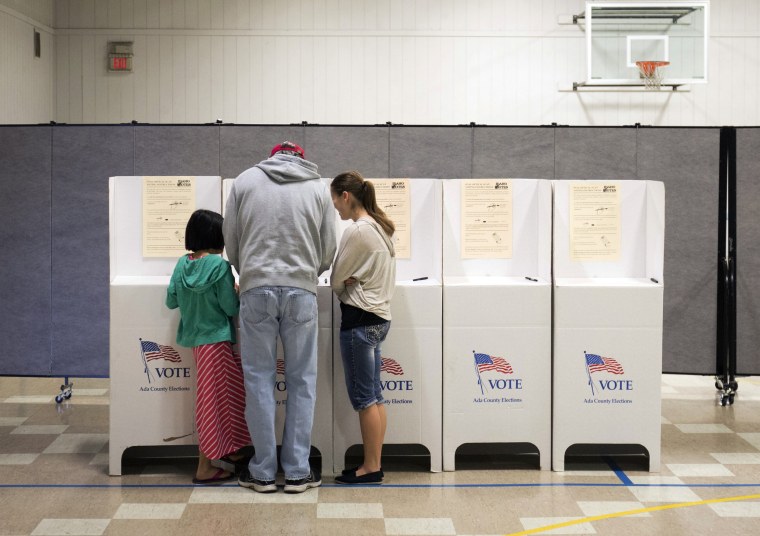While Donald Trump has raised the specter of voter fraud involving the identities of dead voters on Nov. 8, elections experts say such fears are based in more fantasy than fact.
"It is possible to have some votes stolen in this way, but it’s not possible to be done on a wide scale,” said Dick Simpson, a University of Illinois-Chicago political science professor, who said there are many safeguards in place to prevent such fraud.
And Simpson would know — he's also a former Chicago alderman.
"The voting process is decentralized from state to state,” he said. “There’s no one button you can push to rig an election” and have thousands of votes be cast by dead people.
Kristen Clarke, of the Lawyers' Committee For Civil Rights Under Law, agreed.
"Many polling sites are presided over by officials who come from the two prevailing parties,” she said. "So there are all kinds of safeguards built into the system making this kind of scenario a virtual impossibility."
Related: Trump Proposes Term Limits for Congress
Trailing in the polls, Trump at a campaign stop on Monday in Wisconsin claimed there are 1.8 million deceased individuals listed as voters, and he said: "I have a feeling they're not gonna vote for me. Of the 1.8 million, 1.8 million is voting for somebody else."
Trump appeared to be cribbing from a 2012 Pew study which found that up to 1.8 million active voter registrations belonged to dead people, but also found no evidence that any fraudulent votes had been cast.
The election officials interviewed by NBC News also could not recall a single instance of a vote being cast by somebody using the registration of a deceased voter. They said the voter rolls are constantly being updated and cross-checked against obituaries and death notices from state health officials.
Simpson said in the past it was easier to sway an election by pulling stunts like stuffing ballot boxes with bogus ballots. Chicago, after all, is where Mayor Richard J. Daley’s powerful political machine found enough Democratic votes to put John F. Kennedy over the top in the 1960 presidential election — prompting accusations of ballot box stuffing by supporters of Richard Nixon and the Republicans.
Related: Clinton Holds 11-Point National Lead over Trump, NBC/WSJ Poll Finds
But Hillary Clinton, who is from the Chicago suburb of Park Ridge in the blue state of Illinois, is not going to lose to Trump on her home turf, said Simpson. And it’s a lot harder for the dead to vote in Chicago these days.
"Each voter now receives a postcard at their home address," he said. "If that’s not turned in at the polling place, the name is cleared from the voter rolls. We may still have the occasional dead person on the voter rolls, but not tens of thousands. And they would still have to turn in their postcard.”
The most common way of vote stealing still practiced in the city of Chicago involves absentee ballots, said Simpson.
"In this scheme, the precinct captain collects absentee ballots from nursing homes and votes for them," said Simpson. "It happens, but it doesn’t happen a lot. Again, the numbers of votes likely to be stolen is in the hundreds, not in the tens of thousands."
Similar safeguards are also in place in the must-win for Trump state of Iowa.
"There are multiple ways Iowans who have passed away are removed from the voter rolls," said Kevin Hall, spokesman for Iowa Secretary of State Paul Pate. "When the Secretary of State’s Office receives official notification from the Iowa Department of Public Health of someone passing away, that person is removed.”
"County auditors also receive official notifications from the county recorders," he said. Those auditors also comb through the obituaries "on a daily basis as well."
"We also remove deceased voters when receiving official notification from family members," he said.
Related: Election Officials Say 'Rigged' Election Unlikely
So when was the last time Iowa got a report of a dead person casting a vote?
"During the 20 months of Secretary Pate’s administration, which started in January 2015, we have no reports of anyone impersonating a deceased Iowan casting a ballot," Hall said.
It was a similar story in Massachusetts, another state Trump is unlikely to win.
"We notify the cities and towns just before the election," said Brian McNiff of the Massachusetts Secretary of the Commonwealth office. "We provide them with the death list, which is developed by the state department of public health, of people who have died and who were residents of Massachusetts. So that is one check they have on deceased registered voters.”
Asked if he could think of an incident where a vote was cast by a dead voter, McNiff said, "No, I really can’t."

